
Bailey Glasser’s ERISA litigation team won another victory before the U.S. Court of Appeals for the Second Circuit, which declined to reconsider a May 2024 ruling that an employee stock ownership plan trustee and selling shareholders in a stock sale to the plan can’t compel individual arbitration of a representative action on behalf of the plan accusing them of overcharging the plan, rejecting the trustee’s argument that the panel unfairly displayed “hostility to arbitration.”
In an order filed on July 9, the Second Circuit rejected Argent Trust Co.’s petition for panel rehearing or rehearing en banc, doubling down on its divided May 1 opinion that found allowing arbitration would have prevented a plan participant from seeking plan-wide remedies authorized by federal benefits law.
The case involves a proposed class of employees seeking relief under federal ERISA law. This decision addressed one of the most important issues in employee benefits litigation today: whether ERISA plan sponsors can force employees to waive plan-wide relief in favor of individualized arbitration, thereby gutting participants’ ability to enforce the core private right of action ERISA affords. This repeated victory for participant rights follows a victory by BG’s ERISA litigation team on the same issue before the Third Circuit in June 2023.
The Court’s May 2024 opinion backed the Southern District of New York’s November 2021 order denying a motion to compel arbitration of an ESOP participant’s suit alleging mismanagement by Argent, which served as trustee to debt relief company Strategic Financial Solutions’ ESOP, and the selling shareholders and their trusts.
The Bailey Glasser team in this matter is comprised of partner and Practice Group Leader Gregory Porter and partner Ryan Jenny, both in Bailey Glasser’s Washington, D.C. office. Co-counsel in this case is Tillman J. Breckenridge, Peter K. Stris, Rachana A. Pathak, and John Stokes of Stris & Maher LLP.
To learn more about our award-winning ERISA practice – including our 2025 nationwide Chambers & Partners ranking, visit this link: https://www.baileyglasser.com/services-erisa-employee-benefits-and-trust-litigation
The case is Dejesus Cedeno v. Argent Trust Co., docket number 21-2891, U.S. Court of Appeals for the Second Circuit.
For more, read this Law 360 article: https://www.law360.com/articles/1856532?e_id=e710f5b1-e0ec-4910-bc7f-0d1e404a2625&utm_source=engagement-alerts&utm_medium=email&utm_campaign=similar_articles?copied=1

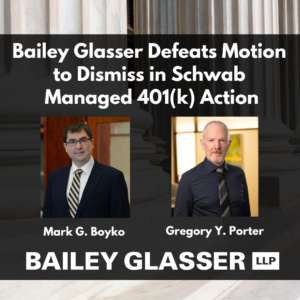 BG secured an important win for employee participants of the Vituity and MedAmerica 401(k) retirement plan. On Friday, U.S. District Court Judge Richard Seeborg of the Northern District of California ruled on a motion to dismiss filed by CEP America and the MedAmerica Retirement & Benefits Committee, which oversees the 401(k) plan offered to employees and retirees of Vituity and MedAmerica. In his ruling denying the motion in part, Judge Seeborg noted that the Complaint alleges that the fees charged by recordkeepers to other 401(k) plans “were multiples less than those charged” by Schwab.
BG secured an important win for employee participants of the Vituity and MedAmerica 401(k) retirement plan. On Friday, U.S. District Court Judge Richard Seeborg of the Northern District of California ruled on a motion to dismiss filed by CEP America and the MedAmerica Retirement & Benefits Committee, which oversees the 401(k) plan offered to employees and retirees of Vituity and MedAmerica. In his ruling denying the motion in part, Judge Seeborg noted that the Complaint alleges that the fees charged by recordkeepers to other 401(k) plans “were multiples less than those charged” by Schwab.
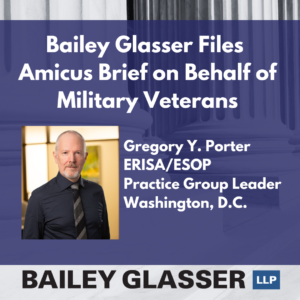
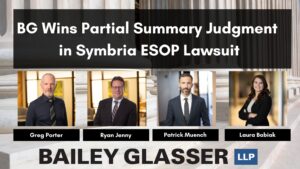
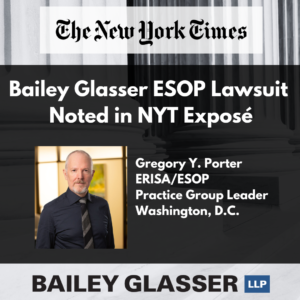
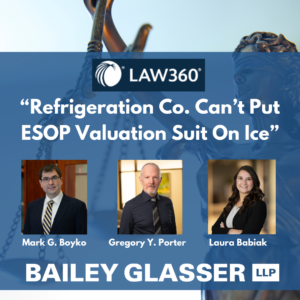 Bailey Glasser’s ERISA team achieved another litigation win in the fight to protect employee retirement funds. In an order issued Tuesday, a North Carolina federal judge denied industrial refrigeration company, Morris & Associates’ motion to dismiss former CEO Bryan John’s ERISA case that alleged the company mismanaged an employee stock ownership plan by grossly undervaluing the business.
Bailey Glasser’s ERISA team achieved another litigation win in the fight to protect employee retirement funds. In an order issued Tuesday, a North Carolina federal judge denied industrial refrigeration company, Morris & Associates’ motion to dismiss former CEO Bryan John’s ERISA case that alleged the company mismanaged an employee stock ownership plan by grossly undervaluing the business.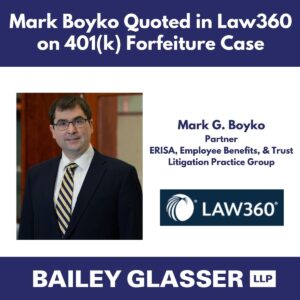 Bailey Glasser partner
Bailey Glasser partner 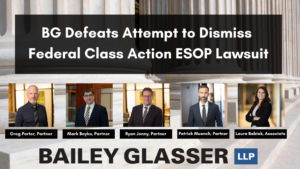
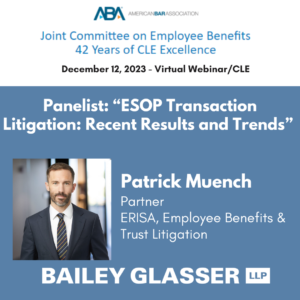 Join Bailey Glasser Partner Patrick Muench December 12, 2023, at 1pm EST for a virtual webinar discussion on ERISA litigation involving Employee Stock Ownership Plans (“ESOPs”) hosted by the American Bar Association’s Joint Committee on Employee Benefits. This event will include a review of some common areas of dispute in ESOP cases and a summary of trends and recent court decisions.
Join Bailey Glasser Partner Patrick Muench December 12, 2023, at 1pm EST for a virtual webinar discussion on ERISA litigation involving Employee Stock Ownership Plans (“ESOPs”) hosted by the American Bar Association’s Joint Committee on Employee Benefits. This event will include a review of some common areas of dispute in ESOP cases and a summary of trends and recent court decisions.